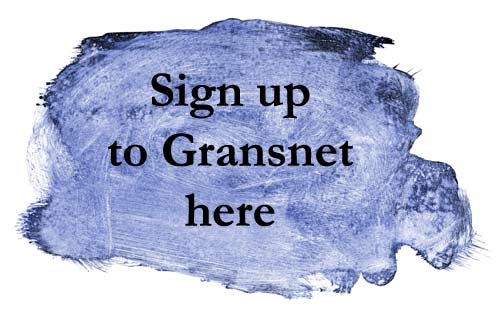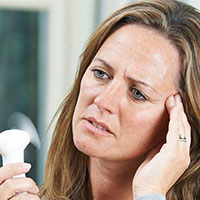Another Tired Kicking For The Sick And Disabled By Rishi

Menopause and insomnia - how to sleep well
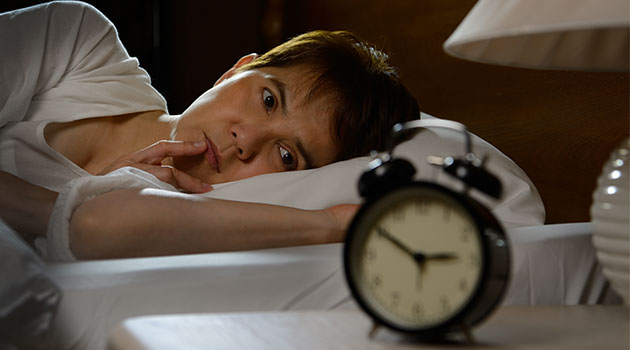
If you find yourself awake in the small hours desperately willing yourself asleep, it may be that menopause is the culprit in question. A common symptom of menopause, insomnia during this time is caused by a number of reasons linked to the changes happening to your body. So why does it happen and what can be done to improve your quality of sleep? We've put together some useful tips to help you get some shut-eye, including some advice from Dr Philippa Kaye, author of The M Word.
Get support and advice on our menopause forum...
What causes menopause sleep problems?
While sleep is essential for both your physical and mental wellbeing, it's often difficult to switch off at night - no matter how tired we might be before our heads hit the pillow. In fact, the NHS predicts that 1/3 of us will experience insomnia during our lives. During the perimenopause and after the menopause itself, insomnia can be a huge issue, as is fatigue, though of course the two are most definitely intertwined. There are receptors for the hormones oestrogen, progesterone and testosterone all over the body, including your brain, which is why you can have symptoms which affect all parts of your body, not just the reproductive system, and insomnia is one of these. Some of the factors which affect your sleep during the menopause include:
1. Hot flushes and night sweats
"I used to have awful night sweats, having to get up and dry myself three or four times a night."
"I have been suffering from these debilitating night sweats for over a year now. I can’t remember the last time I had more than an hours sleep at any one time."
Hot flushes and night sweats are common menopausal symptoms which can be responsible for insomnia due to the discomfort they cause. As women reach menopause and hormone levels - namely oestrogen and progesterone - change, this can create havoc with our body temperature regulation, resulting in those sweats which can keep you up in the middle of the night or cause you to wake up literally being able to wring out your nightclothes.
Try keeping your room as cool as possible, or as much as any partner may tolerate, or even having two duvets of different togs, one for yourself and another for your partner. Wear natural fibre nightwear or a fibre which wicks away sweat. You could also try a gel insert for your pillowcase or under your sheet which cools down when pressure is applied when you lie down.
2. Increased anxiety
"I became anxious, depressed and extremely emotional when going through the menopause."
Another unpleasant side effect of menopause is mood changes, including anxiety and depression, which can lead to sleepless nights spent worrying. This, like many other symptoms, is caused by the dip in oestrogen levels.
Dr Kaye says insomnia and fatigue can be a sign of mental health issues, for example in anxiety there may be difficulties getting off to sleep, while in depression you often wake up in the early hours of the morning and can’t drift off again. If this is your first episode of depression or anxiety, antidepressants are not the first line of treatment around the time of the menopause for these symptoms and instead you may benefit from HRT.
3. Fluctuating hormones
"For the first few years I suffered from insomnia. I didn't take any night sedation, and just tried to get on with everyday life. I worked permanent night duty too! I am pleased to say that now, 10 years since my last period, my sleeping pattern has more or less returned to normal."
As well as causing the other issues that have a knock-on effect on your sleep, you can blame hormones yet again for the difficulty you may face when trying to nod off. Progesterone levels - a sleep-producing hormone - decrease as you go through menopause, meaning it may be more challenging to get the recommended seven to nine hours sleep a night. The declining levels of oestrogen also play a role here and can also mean that you feel more fatigued during the day, meaning you are less likely to exercise, which in turn helps with your sleep.
Six ways to sleep better during menopause
1. Take HRT

Hormone replacement therapy (HRT) is an effective drug used to treat menopause symptoms. It works for lots of menopausal symptoms, from insomnia, to hot flushes, depression, joint pains and fatigue. If you feel well in yourself you are more likely to exercise which in turn helps with sleep. A good night’s sleep will improve both your physical and psychological health.
It's been proven to reduce hot flushes, so if that's what's keeping you up at night, it may be worth talking to your doctor about the treatments available to you. To read more about the risks and benefits of HRT you can visit our guide here.
2. Cool your bedroom
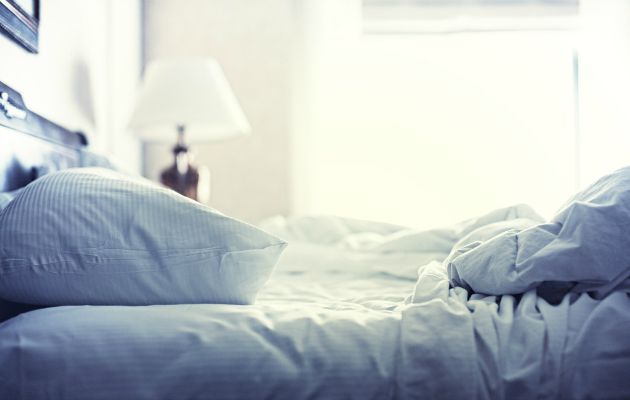
Easier said than done, we know. If you suffer from night sweats, something to consider is a cooling gel pad for your bed. They work by directing heat away from the body and, as a bonus, soothe aches and pains too. There's also this pillow gel inlay from Amazon that helps to keep your temperature down.
It goes without saying that turning the heating down as low as you can stand it during the night, assuming you don't already, should help, as well as investing in a fan to cool you down. Another solution is buying an empty spray bottle, like this one from Boots, so you can fill it up with cool water and use it as a mist during hot flushes.
3. Block the blue light

Do you use your phone just before bed? Watch TV? Browse Gransnet the web on your laptop? Using electrical devices within an hour of going to bed means that you're absorbing extra blue light - which disturbs your circadian rhythm, which in turn disturbs your sleep. If you don't want to forgo your favourite programme before bed (and don't mind looking like a bit of a chump for an hour) invest in a pair of blue light-blocking goggles, like these Skyper Safety Glasses, £14.24, Amazon.
Dr Kaye recommends leaving your phone outside the bedroom. Even if it is off, turned over, or on silent it still affects your sleep. Keep your bedroom dark and cool and don’t use it for anything but sleep and sex, if you work on your bed all day you won’t associate it as a place for sleeping.
Join over 350,000 users on Gransnet today...
4. Make exercise a part of your lifestyle
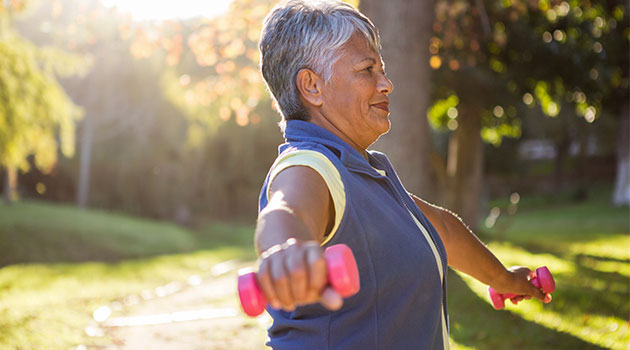
Whether your thing is walking, swimming or maybe a gentle exercise DVD, in order to get a good night's sleep, it's important to stay active during the day. Getting half an hour's exercise four times a week should help you settle in for a better night's rest - provided you finish exercising two to three hours before you actually hit the hay.
5. Try a meditation app

If you sometimes find an active mind keeps you up at night, try a mindfulness or meditation app to calm your thoughts before bed and help you relax. Headspace has a number of guided meditations to try, and also has recordings specifically for getting to sleep. Calm is also a popular choice where you can specify that you want to focus on improving your sleep quality.
6. Use natural aromatherapy aids

While there isn’t evidence that these sprays will work for everyone, some people find them relaxing and that they help them sleep. Helping your mind by associating sleep with a routine such as a warm bath and a particular smell may also aid sleep.
This Works Deep Sleep Pillow Spray, Boots
Natural sleep remedies are important for those who prefer not to use medication as a sleep aid. Amid rave reviews, it appears that this product, as the name suggests, does actually work. Spritz all over your pillow before bed and let it soothe you to sleep. If you wake up during the night and find the scent has worn off, give it another spray.
Infused with jujube and camomile, The Body Shop's quick-drying pillow and body mist has a lovely fragrance and, again, is reported to help to relax enough to send you off into a deep sleep.
A final word on sleeping pills from Dr Kaye: Many people think that sleeping pills are the answer to sleeping well but doctors are reluctant to offer them as they are extremely addictive and stop working pretty quickly, meaning you need higher and higher doses to help you get to sleep. Instead try sleep hygiene, sticking to the same waking up time, no matter what time you went to bed, avoid day time napping and try the hints above.
Dr. Philippa Kaye is author of The M Word: Everything You Need to Know About the Menopause. Find out more and order your copy here.
Disclaimer: The information on our health pages is only intended as an informal guide and should not be treated as a substitute for medical advice. Gransnet would urge you to consult your GP before you begin any diet if you're concerned about your weight, have existing health conditions and/or are taking medication.
Images: Shutterstock
